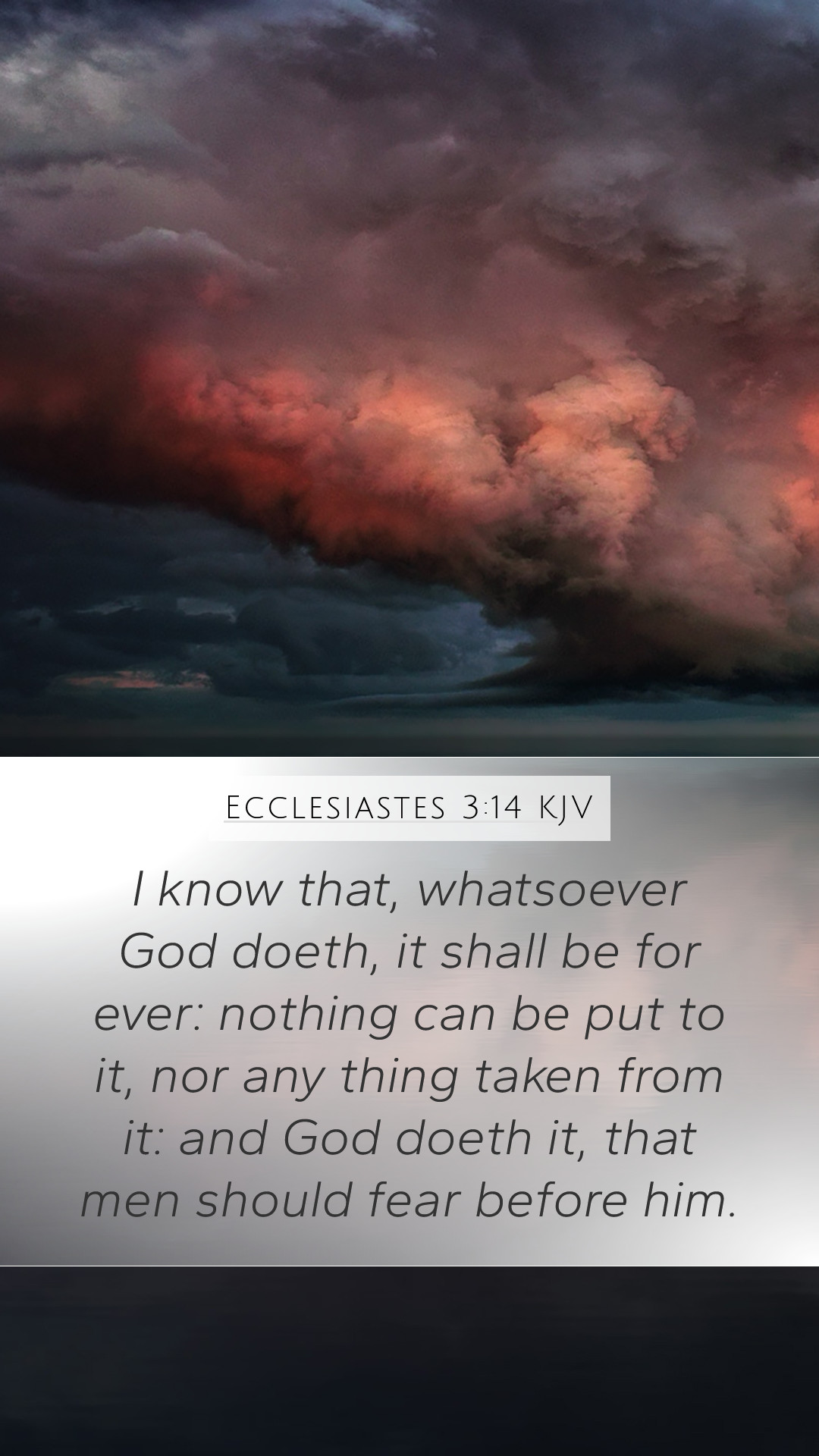Understanding Ecclesiastes 3:14
Bible Verse: Ecclesiastes 3:14 (ESV) - "I perceived that whatever God does endures forever; nothing can be added to it, nor anything taken from it. God has done it, so that people fear before him."
Overview of Ecclesiastes 3:14
This verse is a profound reflection on the eternal nature of God's works. The author, traditionally thought to be King Solomon, emphasizes God's sovereignty and the unchangeable nature of His plans. It serves as a reminder that human efforts are ultimately insignificant compared to divine purpose, evoking a sense of awe and reverence towards God.
Bible Verse Meanings
- God's Sovereignty: Emphasizes that God's actions stand firm and permanent.
- Human Limitations: Highlights the futility in trying to alter God's divine will.
- Awe and Reverence: Encourages believers to approach God with fear and respect.
Bible Verse Interpretations
The interpretation of this verse falls into several key themes:
- Divine Perfection: God's works are perfect, and nothing can enhance or diminish them.
- Temptations of Change: Humans often seek to change or manipulate situations for personal gain, but this verse warns against such pursuits.
- Enduring Nature of God's Decrees: All that God decrees has eternal value, reflecting his character and fidelity to his promises.
Bible Study Insights
For those engaging in online Bible study or group discussions, Ecclesiastes 3:14 can inspire various thoughts:
- Consider how God's unchanging nature applies to life circumstances today.
- Explore the impact of human decisions in light of divine sovereignty.
- Discuss the importance of reverence for God and how it shapes daily conduct.
Commentary on Ecclesiastes 3:14
According to Matthew Henry's commentary, this verse presents a crisp summary of the futility of human endeavors in contrast to God's eternal plans. Henry notes that God orchestrates life events to instill fear and respect in mankind, which is crucial for a relationship with the Creator.
Albert Barnes reinforces the position that God's actions—unlike human actions—are never subject to revision, showing the complete and sufficient nature of God's decrees. Barnes suggests that this understanding fosters a healthy fear of God, guiding believers to trust in His wisdom.
Adam Clarke’s analysis focuses on the necessity of recognizing human limitations. Clarke suggests that attempts to manipulate or undermine God's intentions often lead to disillusionment, and advises believers to live in accordance with divine principles, recognizing their place in God's plan.
Applying Ecclesiastes 3:14 to Daily Life
Understanding this scripture can greatly influence personal faith and behavior:
- Embrace humility by acknowledging God’s supreme authority over all aspects of life.
- Seek to align personal goals more closely with God’s will rather than attempting to go against divine purposes.
- Develop a practice of worship centered on gratitude for God's perfect and unchanging works.
Cross References
This verse closely relates to several other scriptures, enhancing its themes:
- Psalm 119:89: "Forever, O Lord, your word is firmly fixed in the heavens."
- Isaiah 46:10: "Declaring the end from the beginning and from ancient times things not yet done."
- James 1:17: "Every good gift and every perfect gift is from above, coming down from the Father of lights."
Conclusion
Ecclesiastes 3:14 serves as a crucial commentary on the enduring nature of God's works and the importance of recognizing our own limitations in relation to the divine. By embracing the truths encapsulated in this verse, believers can cultivate a deeper understanding of God's sovereignty, leading to a more meaningful and reverent approach to life.


